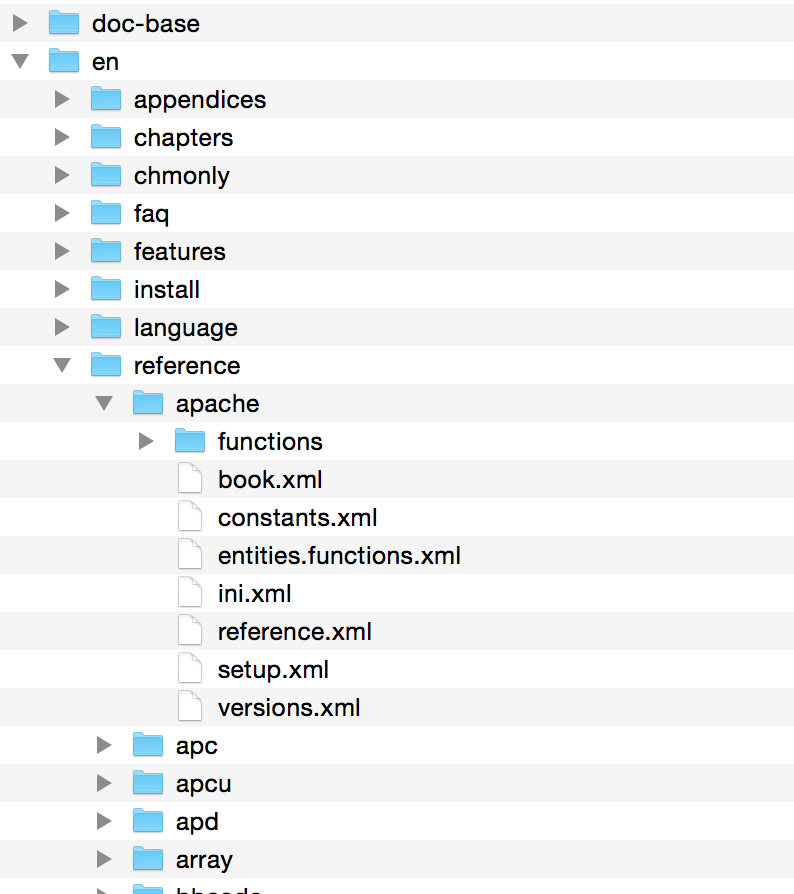Contributing to PHP: How to Contribute to PHP’s Manual
In this two-part article series, we’ll be covering how to contribute to the PHP project. This will hopefully clarify what steps need to be taken for those looking to become more involved with PHP.
This first part will be covering how to contribute to PHP’s documentation, including how to request a php.net Account and what to do once an account has been granted.

Key Takeaways
- Contributing to PHP’s documentation is a way to improve the language and take your knowledge of PHP to the next level. It can also lead to a php.net account, which allows you to influence the direction of the language.
- The PHP documentation is maintained in DocBook XML format, and while some familiarity with this format is helpful, it’s not essential as it can be learned on the job.
- First-time contributors can use the online documentation editor to submit simple patches. Familiarizing yourself with the style guidelines of the documentation is recommended before submitting any patches.
- If you’re a frequent contributor or need to do more than minor edits, you should consider setting up the docs locally on your computer and request a php.net account. This involves several steps, including creating a docs directory, cloning the docs, and setting up SVN Keywords.
- Contributing to the PHP documentation involves several tasks, including fixing bug reports, translating the documentation, expanding partially documented material, documenting the undocumented, and general page tidy-ups.
Why Contribute to PHP?
Why should you consider contributing to PHP?
PHP is an open source project that relies upon the willingness of its community to invest their time into the project. The more people become involved, the more the community at large stands to benefit. Whether it’s improving the documentation around the language or contributing bug fixes or features to the core, the cumulative efforts of every developer quickly add up.
Becoming more involved with PHP will also help to take your knowledge of the language to the next level. Contributing to the documentation will give you a more thorough knowledge of the language, and contributing to the core will keep you up to date with any changes that are happening to it. Becoming a contributor will also enable you to ultimately request a php.net account, which will put you in a position to help decide what direction the language is heading in. It is therefore definitely a worthwhile thing to do, if you enjoy working with PHP.
About PHP’s Documentation
The documentation is maintained in the DocBook XML format. Generally speaking, little knowledge of this format is required to be able to contribute to PHP’s documentation. It’s easy to pick up, so you can simply follow along with the XML syntax used in other files of the documentation.
The folder structure for the documentation looks as follows:

The doc-base folder contains some tools for converting the XML-based documentation into other formats. You probably don’t need to concern yourself much with this folder, except when creating custom entities (typically used when adding external links to the docs).
The en folder is specific to the English documentation (other translations will follow their respective two letter country code names). This folder is the one you’ll predominantly be working in. The reference folder contains directories that each pertain to an extension. Each extension folder follows the convention of either having a functions folder (for procedural extensions) or folders named after the extension’s classes (for object-oriented extensions). Each extension folder also contains a few other files, including a book.xml file for the extension’s landing page and a versions.xml file for holding versioning information for when each function was introduced.
For more information on the documentation structure, see the Files structure section of the Manual sources structure page.
Also, while an on-going effort is being made to transition the documentation to Git, it is currently maintained using SVN. This means that you’ll need to install SVN and have a basic familiarity with it if you want to set the docs up locally (as seen later).
A First-Time Contributor
If you’re a first-time contributor, then you’ll want to start off by using the online documentation editor. This provides a user interface to enable anyone to log in (using OAuth) and to submit simple patches to the documentation. It’s generally best to log in with the same account each time, so that your contributions remain under a single name only (making it easier to track them if you decide to apply for a php.net account later).
The online editor is almost always the starting point for new documentation contributors. By demonstrating the ability to submit patches and have them subsequently accepted, it shows competence and willingness to contribute.
As a first-time contributor, you’ll want to also familiarize yourself with the style guidelines of the documentation before submitting any patches.
Example
Let’s resolve bug #71716 from bugs.php.net. The report says that one of the demonstrative examples is incorrect, where the MongoDB Client class is namespaced incorrectly.
After verifying this (by running the connection script locally), we can fix this using the online editor:
For more information on how to use the online editor, see the wiki editor’s Getting Started page.
PHP Docs Local Setup
The online editor, however, isn’t the nicest of ways to contribute to the documentation and it is also very limited in what it can do. It should therefore only be used for minor edits and serve as a first stepping stone to getting involved in the documentation side of the project.
If you would like to do anything outside of the editor’s capabilities (such as documenting a function or extension from scratch), or you are becoming a frequent contributor to the docs, then you’ll want to set up the docs locally and request a php.net account.
Setting up the PHP docs locally on your computer is a one-time inconvenience. It can be done with the following steps:
-
Create a docs directory. This will be used to hold the docs and docs-related stuff in one place:
mkdir phpdocs cd phpdocsThe rest of the steps all assume you are in the phpdocs directory, unless stated otherwise.
-
Clone the docs. Use SVN to pull down a copy of the repo. In our case, we are looking to get the English manual, and so we specify the doc-en module (at the end):
svn checkout https://svn.php.net/repository/phpdoc/modules/doc-en -
Clone PhD. PhD is a tool that renders the DocBook XML format into different output formats.
git clone http://git.php.net/repository/phd.git -
Clone the php.net website. This will be used to view the documentation locally, so that you can see the changes as they would appear on the website before pushing them.
git clone http://git.php.net/repository/web/php.git web-php rm -fR web-php/manual/en ln -s rendered-docs/php-web web-php/manual/enWe need to remove the dummy docs located in web-php/manual/en, and then set up a symbolic link to here from the generated documentation files (generated via PhD) at rendered-docs/php-web.
-
Setup SVN Keywords. The DocBook files all have a
<!-- $Revision: 338832 $ -->comment near the top of the file. We need to configure SVN to automatically update this value whenever a file changes by configuring its automatic properties. To do this, simply add the following line to~/.subversion/config(the automatic properties part is somewhere near the end):*.xml = svn:eol-style=native;svn:keywords=Id Rev Revision Date LastChangedDate LastChangedRevision Author LastChangedBy HeadURL URLThe revision ID tracks file changes, which is used by docs translators to see which files need to be updated.
-
Add workflow file. This is optional, but you’ll find it very useful to have the commands to validate, build, and view the docs locally at hand. Paste the following into a file called ref:
# Validate the DocBook XML php ~/phpdocs/doc-en/doc-base/configure.php # Build the docs php ~/phpdocs/phd/render.php --docbook ~/phpdocs/doc-en/doc-base/.manual.xml --package PHP --format php --output ~/phpdocs/rendered-docs # Run the php.net website locally cd ~/phpdocs/web-php php -S 0.0.0.0:4000The above assumes that your
phpdocsfolder is located in your home directory – if not, then update the paths accordingly.
And now you’re all set up!
Docs Workflow
With everything set up, it’s time to take a look at the workflow for contributing to the docs locally. For this, let’s resolve bug #71866.
We start by making sure the versioned repos are all up-to-date. This means performing an svn up in doc-en/en and doc-en/doc-base, and a git pull in web-php and phd (typically, you’ll find that only the first repo, doc-en/en, needs to be updated).
Next, we open up the doc-en/en/reference/mbstring/functions/mb-detect-order.xml file and rectify the function’s return value description as per the bug report information:
<refsect1 role="returnvalues">
&reftitle.returnvalues;
<para>
- &return.success;
+ When setting the encoding detection order, &true; is returned on success or &false; on failure.
+ </para>
+ <para>
+ When getting the encoding detection order, an ordered array of the encodings is returned.
</para>
</refsect1>
We then ensure that we haven’t broken the docs builds by running the docs validator:
php ~/phpdocs/doc-en/doc-base/configure.php
The docs should validate successfully, and as a result, we should see a picture of a nice ASCII cat.
Now, we can either view the changes locally or commit them. Typically, you will just want to commit the changes (unless you’ve made any drastic changes to confirm that they look fine), but we’ll do it this time for didactic reasons.
We build the documentation by running the PhD tool:
php ~/phpdocs/phd/render.php --docbook ~/php-docs/doc-en/doc-base/.manual.xml --package PHP --format php --output ~/php-docs/rendered-docs
Sometimes this stage fails for me the first time because PHP runs out of memory – just simply re-run the command and it should build fine.
Then change into the php.net website’s directory to start the local PHP server:
cd ~/phpdocs/web-php
php -S 0.0.0.0:4000
Visiting the localhost (on port 4000) and browsing to the mb_detect_order() function, we can see the changes made:

Now that the changes have been made and we’re happy with them, we can commit them. The following parts assume that you have a php.net account. If that’s not the case, then you need not concern yourself with the rest of this section just yet (instead, you may wish to request a php.net account (see below).
cd ~/phpdocs/doc-en/en
svn ci -m "Resolve doc bug #71866" reference/mbstring/functions/mb-detect-order.xml
The commit message references the doc bug so that an automated comment on our behalf can be made on the bug report we’re resolving. You also won’t be able to view your changes right away on php.net, but they should propagate to the servers within a few hours typically. We can then visit bug #71866, and, assuming we’re logged into our php.net account, navigate to the “Developer” tab and close the bug report.
That’s the basic workflow of resolving documentation bugs. Quick and easy!
Requesting a php.net account
Having set the docs up locally and seen the general workflow, you may then want to consider requesting a php.net account with docs karma. (Karma gives contributors differing privileges for various parts of the PHP project. In order to contribute directly to the documentation, docs karma is required on your php.net account.)
There are no concrete prerequisites that must be met prior to requesting a php.net docs account. Generally, though, accounts will only be granted to those who are looking to actively contribute to and maintain the documentation. Past contributions and current efforts are therefore looked at as evidence of competence and willingness to contribute when requesting an account.
To request an account, visit the account request page and read it carefully. Then, fill out the form, submit it, and then email the PHP docs mailing list (phpdoc@lists.php.net) stating why you would like karma, what your wiki account username is, and reference any past contributions you’ve made to the project. If your request is successful, then you’ll be granted a @php.net account.
Documentation to-dos
Aside from fixing the numerous filed bug reports on the documentation, there are other areas of the manual that could be worked on too, including:
- Translating the documentation
- Expanding upon the partially documented material (typically by adding examples) – the reflection extension is a prime example of this.
- Documenting the undocumented – this will involve digging into the PHP source code using the lxr tool
- General page tidy-ups – rephrasing parts (such as removing any “you”s), removing PHP 4-related material, merging useful comments into the manual itself, etc.
General Tips
The following are some tips on contributing, some based on my experience, and others simply reiterating from above because they are important:
-
Follow the style guidelines. Please make sure you’re following the style guidelines, and when contributing, try to rectify documentation that doesn’t follow it. I generally perform at least a quick search for “I ” and “you” in the file I’m working on.
-
Check tangential things. This generally refers to resolving bug reports – don’t just fix the bug, check that related things aren’t affected too. This helps to ensure that bugs are properly resolved. For example, whilst bug #71638 only referenced the
stream_filter_appendfunction, its counterpartstream_filter_prependalso needed to be rectified. -
Be terse. This applies to both writing and code examples. Poorly worded documentation and convoluted code examples make things more difficult to understand. Keep things short and simple.
-
Separate example code from its output. Make sure the output of examples is not put with the examples themselves. This convention helps to keep the example clean and clearly shows its output. For example, when cleaning up the
token_get_allfunction page, I had to move a commented dump of a variable and an explanation out of the example. -
Check the page order. Ensure that the order of content on the page is correct. This creates consistency in the manual, which enables developers to reference it easier. Again, looking at the cleaning up of the
token_get_allfunction, we can see that the changelog section was initially at the bottom of the page, when it should have been above the examples section. -
Remove references to PHP 4. PHP 4 is long gone, and references to it are not only irrelevant now, but they convolute the documentation. Look out for any mentions of PHP 4 (I usually perform a quick grep for it in the file I’m working on) and remove any mentions of it.
-
Properly version files. When creating a new file in the documentation, ensure that its revision id is set to nothing:
<!-- $Revision$ -->(Example.)
Other than when creating new files or translating the documentation, you will not need to worry about the revision ID.
If you’re unsure about something, start by checking out the docs FAQ. If that doesn’t help, then simply send an email to the php-docs mailing list for support.
And just to reiterate, please check that the documentation build passes before committing any changes to the manual!
Conclusion
We’ve seen two workflows in this article when contributing to PHP’s documentation. The first was using the online editor to resolve bug #71716, and the second was using a local setup of the docs to resolve bug #71866. I hope this has served as a clear and pragmatic introduction on how to contribute to PHP’s documentation.
In part 2 of this series, I will be showing you how to get involved with PHP’s internals. This will involve looking at how to fix bugs in the core by taking a pragmatic approach again.
Frequently Asked Questions (FAQs) about Contributing to PHP’s Documentation
What is the process of contributing to PHP’s documentation?
Contributing to PHP’s documentation involves several steps. First, you need to create an account on the PHP website. Once your account is approved, you can start contributing by editing the existing documentation or creating new content. You can also contribute by translating the documentation into different languages. Remember to follow the PHP documentation guidelines to ensure consistency and quality.
Why is it important to contribute to PHP’s documentation?
Contributing to PHP’s documentation is crucial for several reasons. It helps improve the quality of the documentation, making it easier for developers to understand and use PHP. It also helps in keeping the documentation up-to-date with the latest changes and developments in PHP. Moreover, it fosters a sense of community among PHP developers, encouraging collaboration and knowledge sharing.
How can I ensure that my contributions to PHP’s documentation are accepted?
To ensure that your contributions are accepted, you should follow the PHP documentation guidelines. These guidelines provide instructions on the style, format, and content of the documentation. You should also make sure that your contributions are accurate, clear, and concise. It’s also a good idea to get feedback from other contributors before submitting your contributions.
Can I contribute to PHP’s documentation if I’m not a native English speaker?
Yes, you can contribute to PHP’s documentation even if you’re not a native English speaker. The PHP community welcomes contributions from developers around the world, regardless of their native language. In fact, one of the ways you can contribute is by translating the documentation into different languages.
What are some common mistakes to avoid when contributing to PHP’s documentation?
Some common mistakes to avoid include not following the documentation guidelines, submitting inaccurate or unclear information, and not proofreading your contributions before submitting them. It’s also important to avoid making unnecessary changes to the documentation, as this can create confusion for other developers.
How can I get help if I’m having trouble contributing to PHP’s documentation?
If you’re having trouble contributing to PHP’s documentation, you can reach out to the PHP community for help. There are several online forums and discussion groups where you can ask questions and get advice from experienced contributors. You can also refer to the PHP documentation guidelines for guidance.
Can I contribute to PHP’s documentation anonymously?
Yes, you can contribute to PHP’s documentation anonymously. However, creating an account and contributing under your real name is encouraged as it helps build credibility and fosters a sense of community among contributors.
How often should I contribute to PHP’s documentation?
The frequency of your contributions depends on your availability and interest. Some contributors make updates to the documentation regularly, while others contribute occasionally. Regardless of the frequency, any contribution, big or small, is valuable and appreciated.
Can I get paid for contributing to PHP’s documentation?
Contributing to PHP’s documentation is generally a volunteer activity and contributors are not typically paid. However, the satisfaction of helping other developers and improving the quality of the documentation can be rewarding in itself.
What should I do if I notice a mistake in PHP’s documentation?
If you notice a mistake in PHP’s documentation, you can correct it yourself if you’re a contributor. If you’re not a contributor, you can report the mistake to the PHP community so that it can be corrected.
Thomas is a recently graduated Web Technologies student from the UK. He has a vehement interest in programming, with particular focus on server-side web development technologies (specifically PHP and Elixir). He contributes to PHP and other open source projects in his free time, as well as writing about topics he finds interesting.

